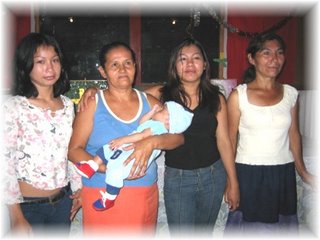Women of strong character
My friend Meg recently wrote in her blog:
Some recent articles highlight the efforts and organizing of some of these women of strong character, working to improve conditions in El Salvador for themselves and their children. On the AJWS website, the work of the Institute for the Investigation, Training and Development of Women (IMU), is featured. This organization seeks to empower women in post-war El Salvador:

Women playing roles as community health workers can have dramatic impacts on the life of rural communities as seen in this story on the website of CARE:
[In El Salvador] there is a strong presence of influential women with strong character. I have met women here who are a definite force to be reckoned with and are seen as the matriarch of a whole family or community at times. These are the women who keep careful watch over every child (no matter what age) and keep the men in line and on their toes. In such a machismo culture, I find this reality to be surprising and a bit refreshing.
Some recent articles highlight the efforts and organizing of some of these women of strong character, working to improve conditions in El Salvador for themselves and their children. On the AJWS website, the work of the Institute for the Investigation, Training and Development of Women (IMU), is featured. This organization seeks to empower women in post-war El Salvador:
El Salvador'’s civil war had a high level of female participation and women served as armed combatants in addition to providing domestic aid to soldiers. However, when the civil war concluded in the 1990s, women experienced a backlash: they were criticized for leaving their traditional family roles to fight and found it difficult to re-integrate into Salvadoran society.
It was out of the need for a grassroots and sustainable effort for women'’s empowerment that IMU was born. IMU (in Spanish: Instituto de Investigación, Capacitación y Desarrollo de la Mujer) was founded in 1986 to address that intersection of gender and civil strife in post-conflict El Salvador. Its first director was killed in the war's final offensive. Despite this loss, IMU continued to carry out its objective of fighting gender discrimination and the subjugation of women.
With support from AJWS beginning in 2004, IMU began to address the needs of women in the western regions of El Salvador. IMU centers its work around three core areas: research on gender discrimination and women'’s poverty; training women human rights leaders; and supporting grassroots women'’s initiatives in the areas of economic development, community organizing, health, violence prevention and the promotion of responsive local government. The goal, according to Cheyne, is “to create a space where rural women can learn, articulate, and advocate for their rights.
One of IMU'’s pioneering projects is its women'’s studies circles. The study circles, composed mostly of single women raising children, gather together regularly to discuss how human rights pertain to their lives. The participants are trained in community advocacy, parliamentary procedure and gender issues. From these study circles, two community-based organizations have bloomed -- one focusing on domestic violence, the other on economic opportunities.(more).

Women playing roles as community health workers can have dramatic impacts on the life of rural communities as seen in this story on the website of CARE:
A simple premise underlies Delmy Sandovar's health work: Women don't have to suffer the brunt of poverty and children don't have to be constantly sick from something that's preventable. Not in her community.
The 41-year-old mother of four was sick, too - of having to walk a couple of miles every day, carrying five-gallon buckets in each hand to fetch river water. The buckets were balanced but life wasn't.
That's why Sandovar has dedicated the past four years to being a community health worker in Santa Gertrudis.
On the surface, Santa Gertrudis resembles other rural communities throughout Central America
Unpaved bumpy roads are lined on either side by traditional two-room homes made of brick and hardened mud. Families grow corn in nearby fields and children kick around the soccer ball with big dreams of becoming superstars.
But people in Santa Gertrudis now have something that an estimated 1.1 billion people worldwide still don't - access to clean drinking water. In Santa Gertrudis, clean water only begins the story of how Sandovar and other community leaders have taken action to improve health conditions, school attendance and the community's environment. (more).
Comments
always have been always will
the men are 'vale verga'
I know, after 23 years there
too macho, and no HUEVOS, THEY ONLY TALK
VIVA LA NUEVA ALCALDESA DE SAN SALVADOR!
UNA MUJER
but then, I surf
what do I know, I am not speaking of fishermen, they have the biggest huevos
the men in Salvador rely on their pistola, that is their huevos
Viva La Mujer de Salvador
EXCELENTE BLOG POST
about time some truth is said on
'la rede'